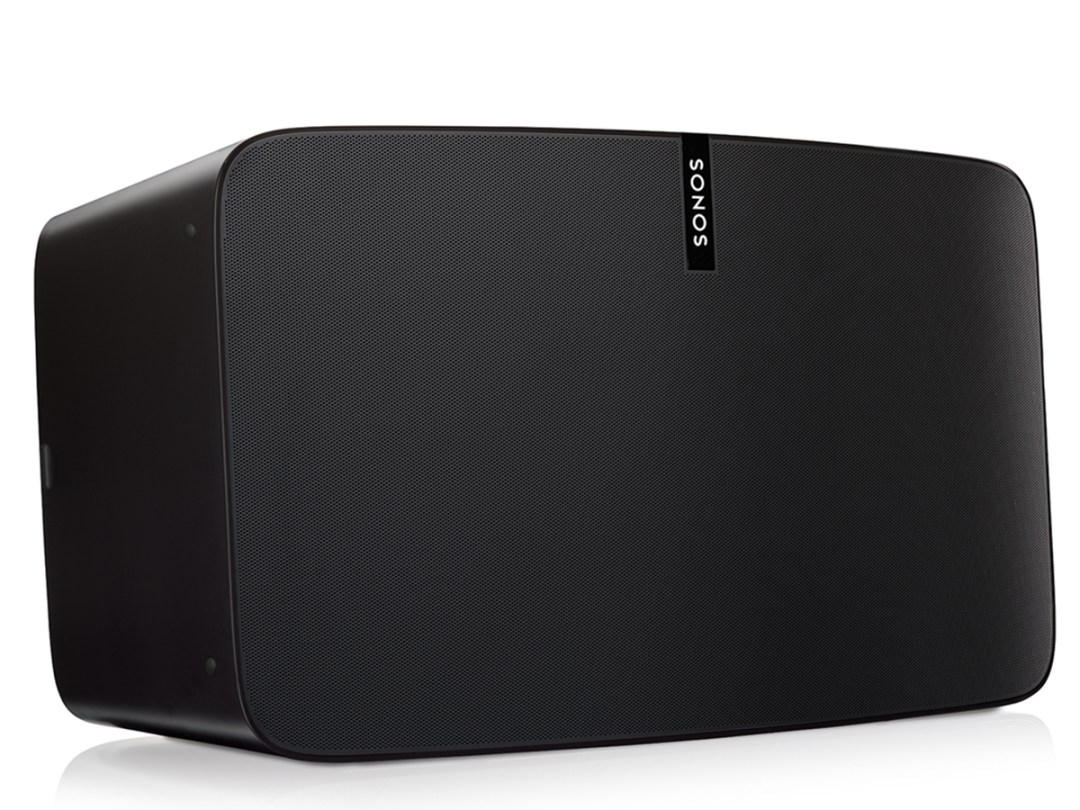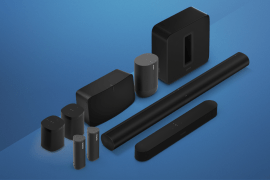Sonos Play:5 review
The original big wireless speaker is back. But is it still best?

Six years is a long time in the tech world. Back in 2009, we were all proudly carrying around netbooks, the iPad didn’t exist and we were only just getting to grips with some streaming company called Spotify. Dark days, indeed.
It was also around this time that Sonos launched the original Play: 5, its first wireless speaker and the one that, until now, had sat as its flagship. Finally, Sonos has decided it can do more.
The new Play: 5 is a speaker that’s been redesigned from the ground up to sound better and be even more of a breeze to use. The result is a speaker that’s fully deserving of its flagship title, and then some.
SIMPLISTIC BUT SMART
The cleaner, more modern look and feel of the Play:5 is almost entirely different to the original, which means it’s a little unexciting. Sonos has gone for a plastic grille over metal this time too, but there are solid reasons for both design choices.
Unlike the original, the new Play:5 can be orientated three ways – on either side, vertically or horizontally. There’s only so much you can do design-wise when you need to ensure a speaker remains alluring from all angles, so keeping things simplistic works for this Sonos.
As for the plastic grille, Sonos gave metal a go but found it affected the Play:5’s Wi-Fi performance too much. While the original had a plastic base to build the antenna in, the new model doesn’t and performance has to come first.
It still looks smart, and this is helped further by a series of slick new touch controls on the top panel. You’ll find controls for volume up/down and play/pause, plus gesture controls that allow you to swipe backwards and forwards to skip tracks.
No need to worry about any dodgy touch controls here – they’re immediately responsive with subtle tones that sound as your touch is registered. They’ll even change functionality automatically depending on orientation, to whichever order makes the most sense.
IT’S ON THE INSIDE THAT COUNTS
It’s not just the Play:5’s external design that’s seen an overhaul. Sonos started from scratch on its insides too, and to sterling effect.
For a start, it jumps from a five-driver design to six, with three 10cm woofers along the bottom and three tweeters along the top. This woofer design is borrowed from the one found in the Play:1, although it’s bigger and more powerful, while the two outside tweeters are in horns to help project sound wider.
By making the casing much deeper, the acoustic volume of the speaker has been drastically increased too, allowing for a much deeper bass response without the need of a bass port. This is because the original suffered from port-chuffing at certain frequencies – a ridiculous name for a really annoying sound you might get listening to bassier tracks at reasonable volume. Now you can turn it up to 11 and really upset your neighbours.
SMOOTH OPERATOR
Sonos has long been the king of hassle-free setups and the new Play:5 is no different. In fact, it’s arguably simpler than ever with the new sync button on the back of the speaker, which along with the free Sonos Controller app for iPhone and Android, is all you’ll need to get your speaker up and running and on to your network.
For a first time setup, there are a few more steps to get going, such as entering your Wi-Fi details and adding your streaming services of choice. Once you’ve completed this process for the first time, adding future speakers for a multi-room setup is done with one press of the sync button to get them on your network.
Setting up a stereo pair is equally easy, though you understandably have to do it with two of the same type of speaker – there’s no pairing a Play:3 and a Play:5 for example. Sonos will show you the options available to you, and if you choose one, it’ll just ask for you to press the sync button on the left hand speaker to get it set up. Easy peasy.
Once you have all your speakers online, you’ll control them using the dedicated Sonos app, which allows you to stream from just about any streaming service out there (though Apple Music is still in development), as well as playback up any music stored on your local network or device, up to CD quality (16-bit/44.1kHz).
TRUE SAY, TRUEPLAY
Sonos has added a new feature into the newest version of its controller app, which aims to adapt the sound of your speaker to suit the room you have it in. It’s due to launch at the same time as the new Play: 5, but will work with all Sonos speakers (apart from the Playbar for now) and is well worth a go.
It prompts you to use your iDevice (iPod touch, iPad or iPhone) to listen to a series of tones emitted from the speaker, before analysing them and tweaking the sound as required. The whole process takes a couple of minutes.
For now, Android devices aren’t supported, but you only need to borrow an Apple device off a mate for the setup process if you don’t own one – afterwards you can control it with your Android device as before.
Results are good. In our testing rooms, Sonos admitted that Trueplay couldn’t make much difference to the Play: 5’s sound, but shove the speaker in a corner or on some dodgy shelving and the improvements are much more noticeable. We noticed bass tighten up and clarity increase through the midrange.
MORE SOUND FOR YOUR POUND
All of this would mean nothing without great sound, and thankfully the Play:5 exceeds expectations by some margin. We’re not sure we’ve ever heard such a big, spacious sound from a single box design… and we’ve heard a lot of wireless speakers.
Not only will it go loud (tinnitus-inducingly so) and maintain its composure, it’s also capable of a wonderfully wide soundstage for something so compact, and will fill the majority of rooms with no trouble whatsoever.
Listen to Earned It by The Weeknd and the Play: 5’s dynamic know-how is laid out for all to hear, really driving home the drum strokes with impact and clout, while still lending a rhythmic fluidity to the strings in the instrumental.
You certainly won’t go wanting for bass either. A playthrough of A$AP Rocky’s L$D shows there is plenty to go at here, but it’s kept tight and punchy. More neutral ears might prefer to take it down a notch in the EQ settings, but it all helps to create the powerful, exciting sound that the Play: 5 is so capable of.
One of the best things about the Play:5’s sound is the clarity through the midrange, which means vocals are always crystal clear and front and centre. Even the busiest instrumentals can’t get in the way, which really helps the Play: 5 deliver when it comes to expression and detail as well.
OLD VS NEW
So, should owners of the old Play:5 should make the upgrade to the new speaker? It’s a tricky one – the Trueplay software release will do a lot to help tune up your old speaker and make it sound better, but there’s no doubt that the Play:5 is head and shoulders better than its predecessor.
The improvements are across the board, too. Bass is not only capable of going deeper, but it’s also more controlled. Clarity through the midrange, particularly on vocals, is much improved, and it’s a considerably bigger, wider sound than the old Play:5 is capable of.
Stereo pairing works much better with this version too, thanks to the more flexible design, and when it comes to quality sound at volume, there’s simply no comparison. Make the upgrade and you certainly won’t be disappointed you did.
SONOS PLAY:5 VERDICT
With the new Play: 5, Sonos has truly delivered on its quest for a new flagship speaker. It has overhauled the design to really push the boundaries of what we expect from a wireless speaker. For current Sonos owners with the cash to spend, adding this to your line up is a no brainer.
It won’t be the perfect solution for everyone though – high-res music is still off the cards and its connectivity is much more limited than you’ll find on its Bluetooth competitors. If you like the idea of a multi-room setup and want a talented streaming speaker, it doesn’t get much better than the new Sonos Play: 5.
Stuff Says…
A reinvention in all but name, the new Play:5 offers even more boom for your buck.
Good Stuff
Tremendous, spacious sound
Composed at volume
Punchy bass
Bad Stuff
Less connectivity than Bluetooth rivals
No high-res support



